“The Soviet Union was one of the initiators of the Second World War”
What should we remember first and foremost about the Second World War and its outbreak? What role did the Soviet Union play, and why was the Molotov–Ribbentrop Pact violated?
The Soviet Union was one of the initiators of the Second World War. The conflict began with the partition of Poland, in which the Nazi Third Reich and the communist Soviet Union actively participated. Viewed in a broader context, the Second World War was a continuation of the First World War – a war of revenge pursued by two defeated empires: the German Empire and the Russian Empire, which by then had taken new forms.
In 1939, their alliance was formalised with the signing of the Molotov–Ribbentrop Pact, though it included secret protocols. This alliance, however, was temporary. Each regime sought to rebuild the world in its own image, in direct opposition to the other.
Although they divided territories between themselves in 1939–40, a further clash was inevitable. Adolf Hitler’s concept of Lebensraum envisioned the conquest of the Soviet Union. For the Soviet regime, exporting the communist revolution deeper into Europe – beyond the point where the Bolsheviks had been stopped two decades earlier – remained a priority. It was also a personal vendetta for Joseph Stalin, who dreamed of a global communist revolution.
Thus, when we discuss the outbreak of the Second World War, we must recognise that it was initiated by two totalitarian regimes. The non-aggression pact was, in fact, a deception from the outset. I am convinced that each signatory believed they would eventually gain the upper hand and be the first to strike.
Indeed, Adolf Hitler gained the upper hand initially by launching a surprise attack on the Soviet Union in 1941. The attack was unexpected only because Stalin refused to believe it was coming, despite ample intelligence. In reality, the confrontation that began in 1941 was the inevitable consequence of the events of 1939 – a clash between two empires vying for global dominance.
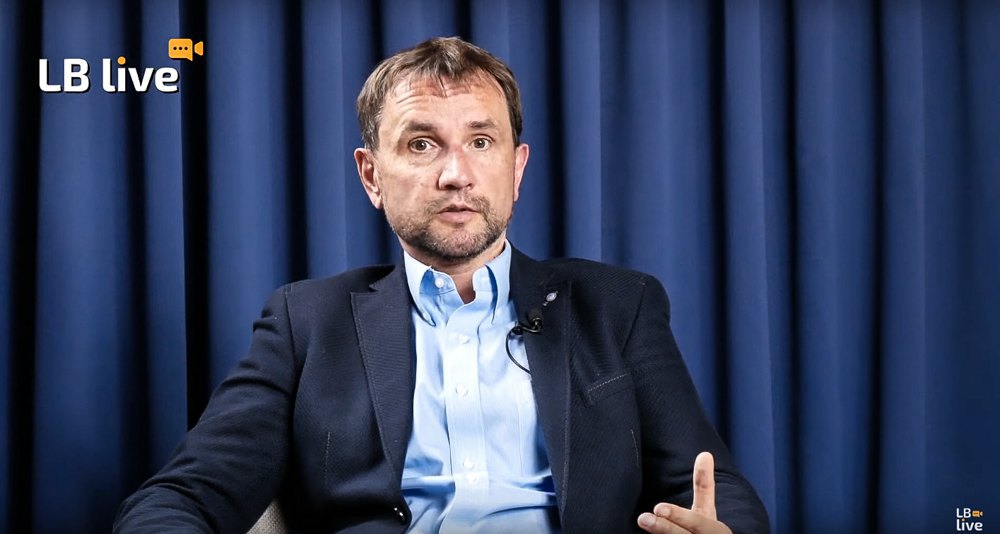
“Russian aggression has prompted Ukrainians to seriously rethink their perceptions of World War II”
What rethinking did Ukrainians undergo after 2014, when Russia began its invasion of our territory, and following the full-scale invasion in 2022?
I believe Ukrainians have significantly re-evaluated their understanding of the Second World War. The war that began in 2014 played a key role in this transformation. Firstly – and regrettably – many Ukrainians have gained direct military experience, as the war affected them personally. This experience led to a realisation of how much falsehood had been perpetuated regarding the previous war.
Secondly, it is crucial to note that Russia attempted to use several Soviet myths and stereotypes associated with World War II in its current war against Ukraine. This raised an important question: “What was the truth?” By 2014, it had already become evident that Russia was spreading disinformation – and the circumstances that unfolded allowed Ukraine to begin a process that had progressed only slowly since 1991.
At that time, Ukraine had begun to reassess the legacy of the Second World War: archives were gradually being opened, and academic research started to dismantle Soviet narratives about the war. However, this progress was slow and lacked state-level support.
Moreover, when Russia made the ideology of “Victory” its state doctrine, it actively exported this narrative to Ukraine, where it began to take root. Unfortunately, influential political forces within Ukraine embraced it. In 2010, under President Viktor Yanukovych, this quasi-religion of victory was fully institutionalised in Ukraine.
Many may have forgotten that, in 2010, a military parade was held on 9 May on Khreshchatyk, featuring soldiers dressed in Soviet uniforms. In other words, what is now widely mocked in Russia was once enacted here in Kyiv. It is worth recalling that during the same period, a law was passed allowing the use of a red flag – termed the “Victory Flag” – alongside the national blue-and-yellow flag on 9 May. This law was later repealed by the Constitutional Court as unconstitutional.
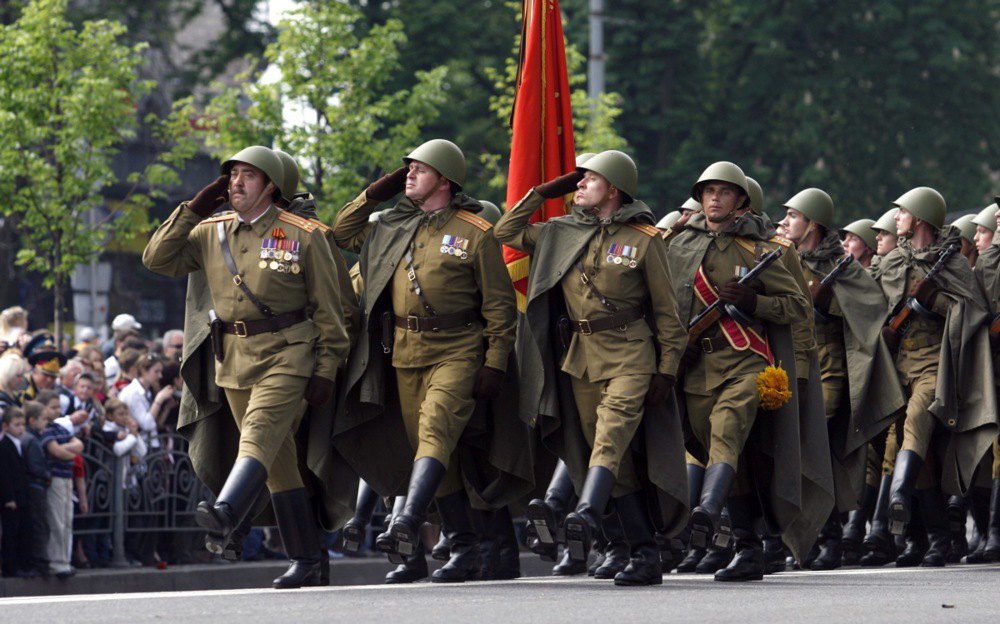
Additionally, on 16 January 2014, as part of the so-called “dictatorship laws”, Ukraine adopted a direct copy of the Russian law criminalising the “incorrect” interpretation of the Second World War. The author of that legislation was a Ukrainian citizen, Kolesnichenko. At that point, Ukraine was moving rapidly along a path heavily influenced by Russia.
It was only the events of the Euromaydan that disrupted this trajectory, providing Ukraine with an opportunity to revisit and reconsider its historical narratives about the Second World War. I believe we have used that opportunity well. For instance, prior to 2014, 58% of Ukrainians regarded 9 May as one of the principal public holidays – second only to Independence Day. By 2024, that number had declined to just 11%.
As a state, Ukraine has finally come to recognise the danger of weaponised myths and the need to construct alternative symbols of remembrance – the red poppy, the first minute of peace, and 8 May, which for some time existed in parallel with 9 May. Why was this parallelism necessary? In 2015, a law was adopted establishing 8 May as the Day of Remembrance and Reconciliation, and 9 May as the Day of Victory over Nazism. Even after 2014, around 38–39% of Ukrainians still viewed 9 May as a major public holiday. Abruptly rejecting this view might have been harmful, which is why the two commemorative dates initially coexisted.
In fact, even in 2022, it would have been possible to pass a law abolishing Victory Day on 9 May. I personally drafted such a bill – but at the time, the political leadership lacked the necessary courage. I recall clearly 8 May 2022, when President Volodymyr Zelenskyy delivered a powerful and timely address to Ukrainians in the context of the full-scale war. The next day, however, his speech on 9 May struck a different tone. It referred to Victory Day as “ours as well” – one that Ukraine would not relinquish. This, despite sociological data already showing that Ukrainians no longer supported this deeply non-Ukrainian holiday.
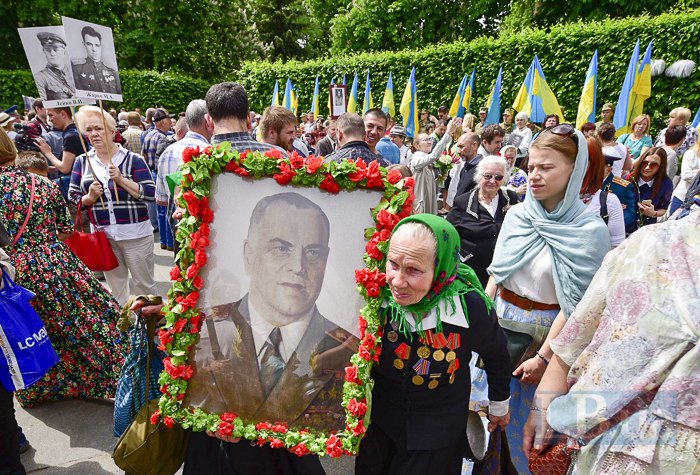
By 2023, the political courage to act finally emerged. The situation was even somewhat ironic: the President’s Office contacted me to ask whether I would object to them using my draft bill. It was understood that if the law were submitted to the Verkhovna Rada under my name – Vyatrovych – it would likely be rejected. And so, the same text I wrote in 2022 was submitted in 2023 under the name of President Zelenskyy and was adopted. I welcomed this move. It is more important to affirm our national victory than to satisfy personal ambitions. Ukrainian society was fully prepared for this shift. We have travelled a long path, dismantling many myths and stereotypes – and we are now ready to move forward.
If we genuinely intend to stop Russia, we must be prepared to engage in a serious and honest discussion about the legacy of the Second World War.
This next stage involves explaining Ukraine’s specific experience of the Second World War to the global community – an experience that remains largely unfamiliar abroad. Doing so would enable the world to better understand the broader dimensions of the conflict. It is vital to convey that there was no conclusive triumph of good over evil in May – or even September – 1945.
Regrettably, only one form of evil was defeated: Nazism. This was, of course, a crucial and positive development – a step towards freedom for many. Yet, half of Europe subsequently fell under the grip of another totalitarian regime: communism. It remained so for decades.
The free world, at the time, chose not to acknowledge that the defeat of Nazism was achieved in alliance with another power – the Soviet Union – which had itself instigated the war in 1939. This omission ultimately enabled communism to be rehabilitated in Russia and later revived. Without this nuanced understanding of the Second World War, it is extremely difficult to grasp the full context of the current war.
Conversely, a proper understanding of that conflict clarifies the origins of today’s Russian imperialism. This unpunished evil festered over time, eventually seeking revenge. The notion of “we can do it again” is precisely what Russia has been preparing for – aided by the silent acquiescence of the West. If we truly aim to stop Russia, we must be prepared to address the history, the consequences, and the role played by specific states – particularly the Soviet Union – in the Second World War.
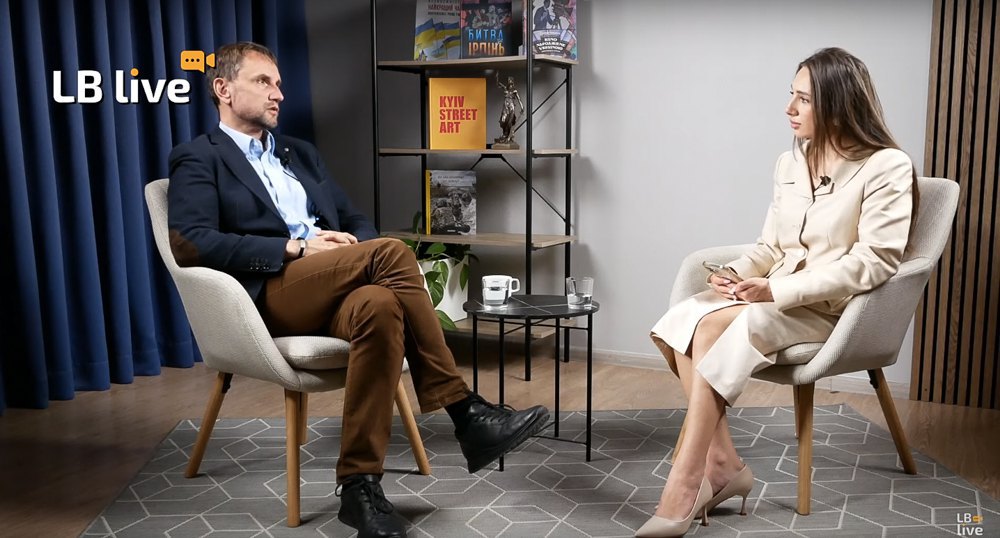
Russia has revived Stalinism under the pretext of commemorating the participants of the Second World War
What is the difference between Russia’s “victory” and what Ukraine commemorates?
The difference lies in our understanding of the Second World War as a profound tragedy in Ukrainian history. Although our history is marked by many tragedies, this war was among the greatest. It claimed the lives of 8 to 10 million people in Ukraine, the majority of whom – over 6 million – were civilians.
We must remember this war as a national tragedy. We must remember the horrific experiences of all Ukrainians who fought in different armies, the civilians deported to forced labour in Germany, those who endured suffering in German captivity, and the soldiers in the Soviet army’s penal battalions – the so-called “blackguards” – who were sent into battle unarmed during the infamous “meat assaults”. Russia continues to use this tactic even today.
This war should serve as a painful lesson about the price Ukrainians paid for lacking their own state. During the Second World War, Ukrainians were compelled to fight for foreign powers – sometimes even against one another. A Ukrainian in the Red Army might have found himself firing upon a Ukrainian serving in the German army.
In contrast, Russia treats the Second World War as nothing more than a military triumph – a victory, and nothing else. It avoids any discussion of the cost: the millions of lives lost, the crimes committed by the Red Army, or the suffering endured. Russia commemorates the war in order to threaten the world: “We defeated Nazism – we can defeat anyone. Be afraid. We can do it again.” While the West vowed “Never again”, Russia sends the opposite message – “We will repeat it.”
Under the guise of honouring Second World War veterans, Russia has fully revived Stalinism – a regime in which human life has no value. This revival has led to the systemic militarisation of Russian society. Society was gradually conditioned and inflamed through campaigns such as the “Immortal Regiment” and military parades – and this ultimately paved the way for the war that is now taking place on Ukrainian soil. Russia was preparing for this all along.
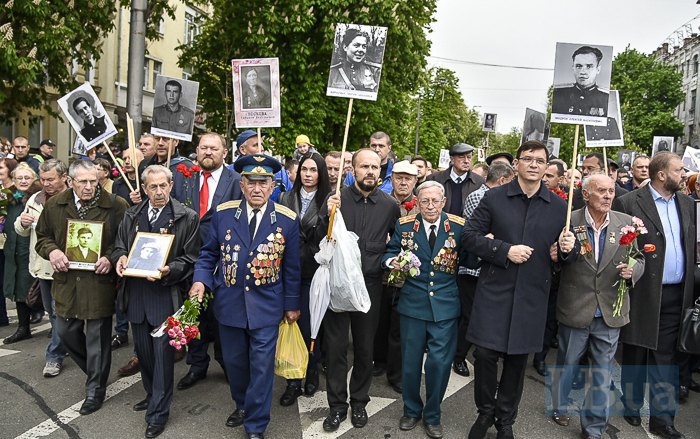
Take, for instance, the “Immortal Regiment” initiative. It originated as a grassroots effort in Russia’s Tula Region, where ordinary people genuinely sought to commemorate their loved ones who had participated in the war. But the Kremlin quickly co-opted it, turning it into a massive propaganda tool. It lost all connection with the real people it was meant to honour. Portraits displayed at these events included not only family members, but also Stalin, Zhukov, and others who often had no direct link to the war.
For Russia, references to the Second World War have always served as preparation for the next war. For Ukraine, the memory of that war is a painful lesson – one we must carry in order to ensure it never happens again.
You mentioned that some Ukrainians fought in the Red Army, others fought on the side of Nazi Germany, and others still in the UPA. Why did this happen, and how is it understood today?
It happened because Ukraine did not have its own state. As a result, Ukrainians were seen by all invading powers as a mobilisation resource. They were recruited into foreign armies either by force or through propaganda. The Red Army and the German army employed the same tactics. To them, Ukrainians were mere cannon fodder used to advance imperial interests.
But Ukrainian participation in the Second World War extends beyond those two armies. Ukrainians also fought in other forces engaged in the conflict outside Ukraine: in the British, American, and Canadian armies, and in the French Resistance. And crucially, when we speak about Ukraine’s role in the Second World War, we must give prominence to the Ukrainian liberation movement.
Although much smaller in number – around 100,000 compared to the 7 million Ukrainians mobilised into the Red Army – the liberation movement was far more significant in meaning. It was the only force in the war whose aim was to restore an independent Ukrainian state. It was the only force in which Ukrainians voluntarily took up arms to fight for their own freedom. The rest were deprived of this choice and paid the price for their fathers’ inability to preserve Ukraine’s independence in the early 1920s.
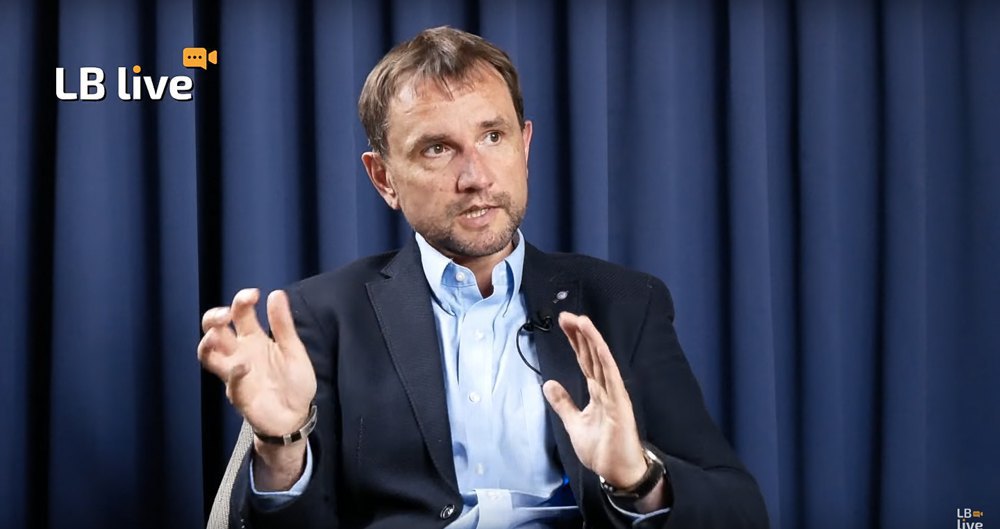
Putin seeks to monopolise the victory over Nazism to hide today’s crimes
Every year, Putin repeats the claim that the Soviet Union won the Second World War without Ukrainian participation – that our contribution was negligible. But the reality is entirely different. Most of the key battles took place on Ukrainian territory, and Ukraine’s role was both immense and indispensable.
Ukrainian losses in the Second World War amounted to 8–10 million people. Of these, 6 to 7 million were Ukrainians who served in the Red Army. In addition, around 120,000 served in the Polish army, about 100,000 in the Ukrainian Insurgent Army (UPA), and tens of thousands more fought in the armies of the Allied nations. Tragically, hundreds of thousands of Ukrainians also ended up in the ranks of the German army. Ukraine was without doubt one of the principal arenas of the Second World War – both in terms of human suffering and strategic importance. Our people and resources played a critical role in defeating Nazism.
Putin is undoubtedly trying to monopolise the victory over Nazism. He uses it as a tool to claim a special status for Russia in the modern world – to present Russia as morally untouchable. Part of this strategy involves concealing the fact that Russia’s permanent membership in the UN Security Council is legally questionable. The Soviet Union was a founding member of the UN, not Russia – yet Putin aggressively promotes the idea that the USSR and Russia are one and the same. This narrative helps obscure the war crimes being committed by Russia today. The logic goes: “We cannot be criminals – we defeated the greatest criminal regime of the 20th century.”
Worryingly, this propaganda is working, at least to some degree, in the West.
Just a few months ago, US President Donald Trump published another strange statement, referring to Russia as a key ally in the defeat of Nazism. This is a striking example of how historical distortion leads to misguided political decisions. Trump’s belief that Russia – rather than the Soviet Union as a whole – was the decisive force behind the victory in the Second World War translates directly into political passivity: “If Russia saved the world from fascism, surely we shouldn’t confront it now.”
Not long ago, some German politicians seriously claimed they could not supply weapons to Ukraine because those weapons might be used against Russia – and they “owed Russia a debt of gratitude” for the Second World War. This is absurd. Germany’s gravest crimes during the war were committed on Ukrainian soil. Ukrainians were among those who suffered the most under Nazi occupation. If anyone is owed a debt, it is the Ukrainian people. And one clear way to honour that debt is by helping Ukraine defend itself – including by providing arms to stop Russia’s renewed campaign of conquest. After all, what we are witnessing now is nothing less than a repetition of the scenarios of the Second World War.
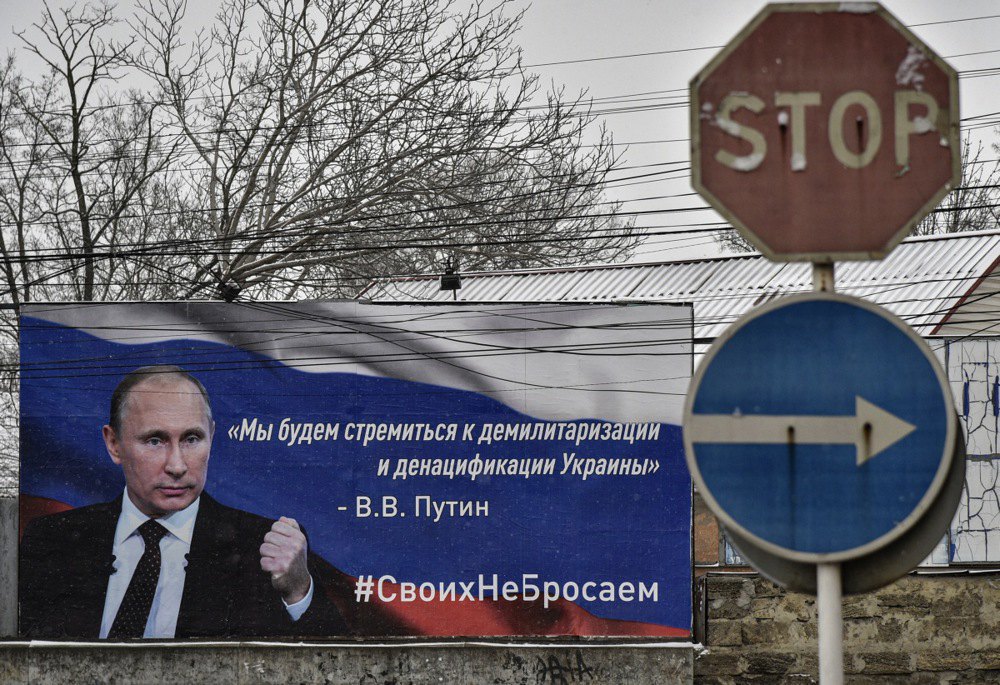
‘Pobedobesie’ (viktory mania) has absolutely infected Russian society, and it will not disappear
How can we explain the paradox that Putin claims to be “fighting Nazis, Banderites, and neo-Nazis” in Ukraine, while the actions of his own military mirror those of the Nazis during the Second World War? After all, what did the Nazis do? They looted, raped, murdered civilians, and mistreated prisoners of war – exactly what Russia is doing now. How is it possible to twist the narrative so completely that Ukraine is portrayed as the aggressor, not the victim?
This is a hallmark of totalitarian propaganda. It reproduces reality in reverse and thrives on mass self-deception. Goebbels, the architect of Nazi propaganda, once said: “If you tell a lie, make it a big one – it’s easier to believe than a small lie.”
Putin’s propaganda follows this exact Goebbelsian model. And tragically, it works. A vast majority of Russians believe this warped version of history: that the Second World War was a glorious, heroic victory led solely by Russia, and that today’s war is just a continuation of that legacy – a defensive fight against “Nazis” in Ukraine. They accept this narrative without question.
Even more disturbingly, for a time, some Ukrainians believed it too. I remember 2014 vividly, when the Russian-Ukrainian war had just begun. At the time, we didn’t even recognise it as a war. Russia was carrying out “special operations” under the banner of the “Russian Spring”, supposedly fighting a “fascist threat from Kyiv”. Wrapped in St George’s ribbons, they managed to mobilise not only Russians but some Ukrainians too – people who genuinely believed they were resisting some sort of fascist regime.
Thankfully, most Ukrainians have since rejected that delusion. But in Russia, it has only grown stronger. This cult of “victory” has utterly infected Russian society. And I do not believe it will simply fade after Putin dies. It is a deep societal pathology.
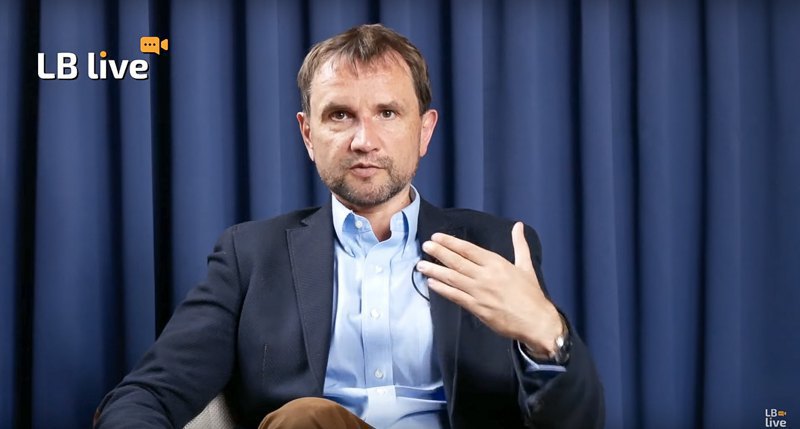
This ideology is eerily similar to Nazism, and it will require external intervention to overcome it. After the Second World War, it was not ordinary Germans who denazified Germany – that task fell to the occupation authorities. I am absolutely convinced that only through external pressure – through some form of de-Russification or de-Putinisation – can Russian society be cured of this obsession.
Would you call Russia’s armed aggression against Ukraine a form of neo-Nazism or neo-fascism?
It’s a mix of many things: neo-Nazism, neo-fascism, Soviet-style imperialism, and elements of communism. That’s why I believe it’s correct to introduce a new term to define the ideological foundation of this aggression – ruscism. It is a postmodern cocktail of ideologies that should be mutually exclusive. On the one hand, communism; on the other, Russian Orthodoxy. These systems should be incompatible – and yet, the Russian regime has fused them into a single, unhinged worldview.
And this hybrid ideology is not only accepted but celebrated by the majority of Russian society. It inspires them, motivates them, and justifies the horrific crimes they are committing – the very crimes Ukrainians are now enduring.
‘Never again’ was a fragile construction from the very beginning, based on only a part of the truth
You’ve already mentioned the opposing slogans “never again” and “we can do it again”. Did Russia ever adopt the “never again” slogan?
No, that’s purely a European concept. Russia has never embraced the Second World War through the lens of “never again”. Let me remind you: the origins of this phrase are deeply rooted in the history of the Holocaust.
It was first used in memory of the Jews murdered by the Nazis during the Second World War, and later became more broadly associated with preventing a recurrence of such horrors. The democratic world accepted it as a guiding principle — a reminder that the war must never happen again.
In Russia, however, war has never been portrayed as something inherently bad. On the contrary, war is seen as an opportunity to display power, to intimidate the world. The slogan “we can do it again” is a deliberate provocation — a cynical answer to Europe’s “never again”.
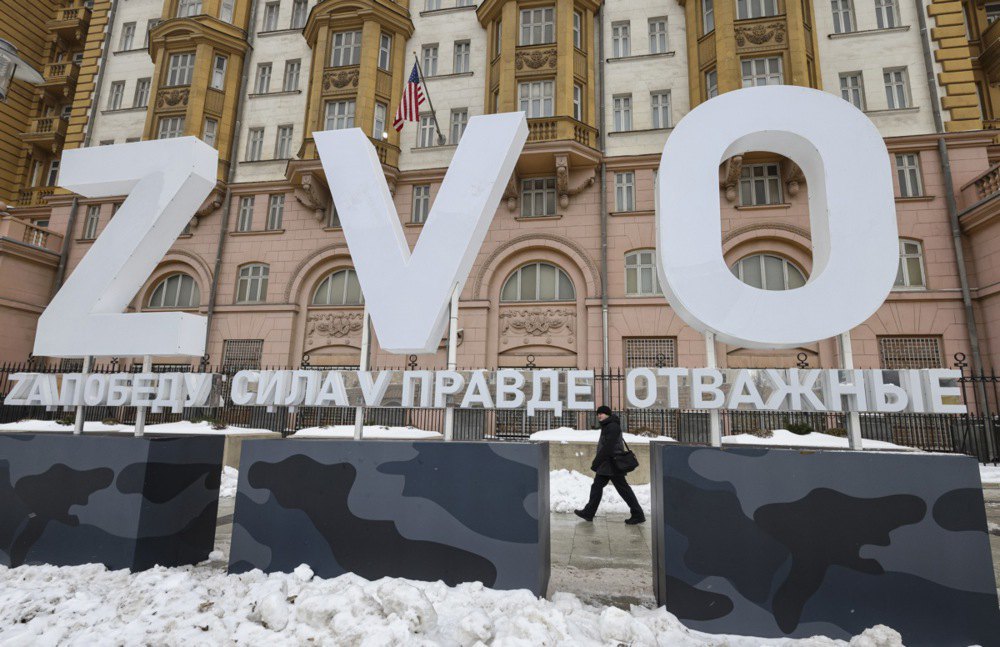
It’s painful to admit, but “never again” has failed. And perhaps that failure was inevitable, because from the very beginning, the slogan contained a contradiction — a kind of delayed-action bomb. In 1945, there was a widespread belief that evil had been defeated once and for all. But in reality, only one evil had been defeated — Nazi Germany. The other evil, the Soviet Union, remained intact and was even celebrated as a liberator.
So the West turned a blind eye to the crimes committed by its former ally after the war. And because of this, “never again” was a fragile construction from the outset — built on only a partial truth. Meanwhile, the Russian slogan “we can do it again” was never about peace. It was always a statement of intent — a preparation for the next war.
That’s why when Putin called the collapse of the Soviet Union “the greatest geopolitical catastrophe of the 20th century”, it fit perfectly with the logic of “we can do it again”.
If the collapse was a catastrophe, it means it must be corrected. And how? Through power, through conquest, through war — all of which Russian society is once again ready to embrace. All that remained was to choose whom to label as Nazis. And they chose Ukrainians — the first to stand in their way.
“If we give Russia any part of Ukraine, it will only increase its aggression”
And who would be next? What do you think?
I believe it would be the Baltic nations, the Poles — anyone who stands in the way of rebuilding the Russian Empire. We must understand one thing clearly: an empire survives only through expansion. The very nature of an empire is to grow — without expansion, it ceases to exist.
That’s why the notion, shared by some Western politicians, that giving away part of Ukrainian territory could somehow pacify Russia and shield Western Europe from further threats is fundamentally flawed. On the contrary — it would only fuel Russian aggression.
And if we look at it in the context of the Second World War, one of the key lessons is that appeasing an aggressor only sharpens his appetite. You cannot feed aggression with concessions. The aggressor must be stopped — that is the lesson from WWII that today’s leaders in the free world must take to heart.
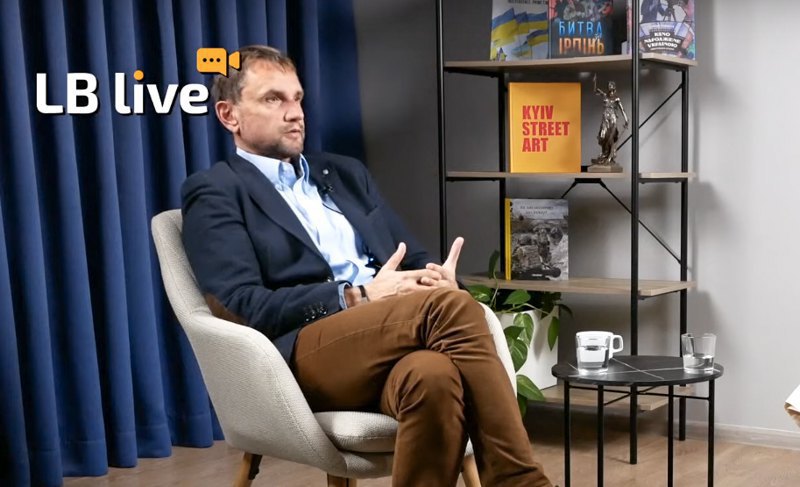
So why, despite that historical lesson, are we now seeing Nazi ideas being tolerated — even revived — both in Europe and abroad? Elon Musk is free to speak his mind, and Kanye West openly promotes fascist rhetoric.
This is, in fact, a serious test for the modern world. I often feel that people underestimate just how alarming these signs are. I believe that Putin, with his “we can do it again” mentality, serves as a kind of inspiration for such pro-Nazi gestures and statements among some Western figures.
Because if Stalin — responsible for millions of deaths — can be openly glorified in Russia today, perhaps some politicians in the West believe it’s acceptable to talk about a kind of rehabilitation of Adolf Hitler too. And that’s profoundly dangerous — not only for Europe but for the entire world. We know what horrors these two criminals unleashed in the mid-20th century. And the potential consequences of even entertaining the idea of their rehabilitation are unimaginably threatening.
How, in your opinion, can the world be united around democratic values — respect for sovereignty, territorial integrity, human rights?
I believe it’s not only possible — it’s absolutely essential. We must realise that only in such a world is there a place for us, especially for Ukrainians. Ukraine’s survival depends on this.
And Ukraine, by its own example, can show the world how dangerous it is to neglect fundamental freedoms. Right now, we are paying the ultimate price for freedom — and for the world’s complacency.
That’s why I see it as our mission, both as a society and as a nation, to demonstrate to the world why these freedoms matter, and what can happen when they’re taken away. Ukraine today is a driving force — a catalyst for uniting the world around the values that underpin peace and dignity. And with that comes responsibility: not only to defend ourselves, but also to protect the world that enabled Ukraine to emerge as an independent nation.







